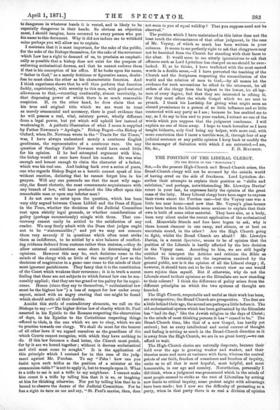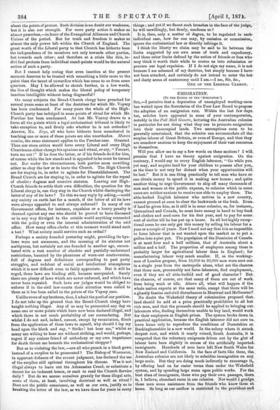THE POSITION OF THE LIBERAL CLERGY.
[To TIM EDITOR OF TRIS " SPECTATOR.") SIII,—In the present High-Church and Broad-Church crises, the Broad-Church clergy will not be accused by the outside world of having erred on the side of frankness. Lord Lyttelton de- scribes their attempts to explain their position as "shifts and subtleties," and perhaps, notwithstanding Mr. Llewelyn Davies' retort in your last, he expresses fairly the opinion of the great mass of the laity. Many Liberal clergy have been eager to express their views about the Purchas case—but the Voysey case was a little too near home—and now that Mr. Voysey's glass-houses have been broken the Liberals seem anxious to explain that their own is built of some other material. They have also, as a body, been very silent under the recent application of the ecclesiastical rod. Meanwhile friends and foes have begun to ask, why is
there honest clamour in one camp, and silence, or at best an uncertain sound, in the other ? Are the High Church going to fight, whilst the Broad Church are afraid ? Mr. Llewelyn
Davies, in a recent Spectator, seems to be of opinion that the position of the Liberals is hardly affected by the late decision in the Voysey case. According to him, we are still legally entitled to interpret the Articles and criticize the Bible as before. This is certainly not the impression received by the general public, nor is it the opinion of all the Liberal clergy ; if, however, it should turn out to be the correct view no one would more rejoice than myself. But if otherwise, why do not the Liberals stand to their opinions as the Ritualists are now standing to their colours? I think the difference of policy arises from the different principles on which the two systems of thought are founded.
The High Church, respectable and useful as their work has been, are retrospective; the Broad Church are prospective. The first are a little behind their age, the second are perhaps a little before it. The old ecclesiastical system which has been galvanized by the Ritualists has "had its day," like the Jewish religion in the days of Christ ; in the minds of most thinking persons it has "ceased to be." The Broad-Church time, like that of a new Gospel, has hardly yet arrived; but as every intellectual and social current of thought and feeling is setting as much in the Broad-Church direction as it is away from the High Church, we are in no great hurry,—we can afford to wait.
The High-Church clerics are naturally desperate, because their hold over the age is growing weaker and weaker, and their theories more and more at variance with facts, whereas the central points of our faith, freedom of conscience and freedom of inquiry, unite us to all that is most hopeful, most helpful, and most honourable, in our age and country. Nevertheless, personally I did think, when a judgment was pronounced which in the minds of most people seemed to strike at the root of Liberalism by setting new limits to critical inquiry, some protest might with advantage have been made ; but I now see the difficulty of protesting as a party, when in that party there is so real a division of opinion
about the points of protest. Such division is no doubt our weakness, but it is also our strength. For mere party action it makes us almost powerless,—in front of the Evangelical Alliances and Church Unions of the period. But for truth and freedom it makes us almost the only power left within the Church of England. The great worth of the Liberal party to that Church has hitherto been the independence of its members not only towards other parties, but towards each other ; and therefore at a crisis like this, in- divi lual protests from individual stand-points would be the natural action of such a party.
Bat I cannot help seeing that even inaction at the present moment deserves to be treated with something a little more to the point than the taunt of cowardice which has come to us from some quarters. May I be allowed to sketch further, in a few words, the line of thought which makes the liberal policy of temporary inaction intelligible without being disgraceful?
On many subjects the Broad-Church clergy have preached for several years some at least of the doctrines for which Mr. Voysey has been condemned. For many years the whole of the High- Church party has indulged in some points of ritual for which Mr. Parches has been condemned. At last Mr. Voysey draws to a focus all the paints which a legal ecclesiastical tribunal is likely to take exception to, and firmly asks whether he is not orthodox? Answer, No. Ergo, all who have hitherto been unmolested in teaching one or more of those poiuts are also unorthodox. Mutat° nomine, the same statement applies to the Purchas case. Granted. Then our stern critics would have every Liberal and every High Churchman either change his opinions and ritual, or cry, " Peccavi, turn me out !" If he does the latter, or if his friends do it for him, of course while the law stands and is appealed to he must be turned out. Bat under the circumstances, both parties seem unwilling either to obey the law or to leave the Church. The High Church are for staying in, in order to agitate for Disestablishment. The Broad Church are for staying in, in order to agitate for the repeal of obsolete dogmas and coercive statutes. Leaving our High- Church friends to settle their own difficulties, the question for the Liberal clergy is, can they stay in the Church whilst disobeying the letter of any of its laws ? To this we may reply by asking,—could any society on earth last for a month, if the letter of all its laws were always appealed to and always enforced? In many of our Government offices, for instance, expulsion or a heavy penalty is decreed against any one who should be proved to have discussed or in any way divulged to the outside world anything connected with the policy or even the internal administration of the said office. How many office-clerks at this moment would stand such a test? What society could survive such an ordeal?
Perhaps a society founded yesterday might, providing its bye- laws were not numerous, and the meaning of its statutes not ambiguous, but certainly not one founded in another age, encum- bered with a vast member of obsolete and partially-understood restrictions, haunted by the phantoms of worn-out controversies, full of dogmas and definitions corresponding to past party struggles, and redolent of social and intellectual atmospheres which it is now difficult even to fairly appreciate. But it will be urged, these laws are binding still, because unrepealed. Surely there are plenty of laws which are never enforced, and which have never been repealed. Such laws our judges would be obliged to enforce if in the civil law-courts their attention were called to them as it has been called to the points of the Voysey case.
Unlike some of my brethren, then, I admit the peril of our position. I do not take up the ground that the Broad-Church clergy have taught nothing illegal. Any of us may be prosecuted any day on some one or more points which have now been declared illegal, and which there is not much probability of our surrendering. But whilst I 'do not and, indeed, cannot, except by recantation, flinch from the application of these laws to myself, why should I lay my head upon the block and say, "Strike! but hear me," whilst so many are willing to hear me without striking, and would, perhaps, regret if any zealous friend of -orthodoxy or my own impatience for death thrust me beneath the ecclesiastical chopper?
But as to violating the law,—are all who preach in a black gown instead of a surplice to be prosecuted ? The Bishop of Worcester, in apparent defiance of the recent judgment, has declared the use of the surplice still optional throughout his diocese. Was it not illegal always to leave out the Athanasian Creed, or substitute a decent for an indecent lesson, or omit to read the Church Service daily ? But do we accuse ourselves gravely for these illegal acts, some of them, at least, involving doctrinal as well as ritual ? Does not the public conscience, as well as our own, justify us in breaking the letter of the law, as we have done for years in many
things ; and yet if we flaunt such breaches in the face of the judger.' he will unwillingly, but firmly, condemn us ?
It is, then, only a matter of degree, to be regulated in each. individual case, how far one may, by omission or commission,. ignore the ecclesiastical law or directly infringe it.
I think the liberty we claim may be said to lie between the limits suggested by our own sense of truth and expediency,- and those other limits defined by the action of friends or foes who- may think it worth their while to coerce us into submission or procure our legal expulsion. If I do not sign my name, it is not- because I am ashamed of my doctrine, but simply because I have.- not been attacked, and certainly do not intend to enter the hot- and dusty arena of controversy until I am.—I am, Sir, &c.,
ONE OF THE LIBERAL CLERGY.

































 Previous page
Previous page